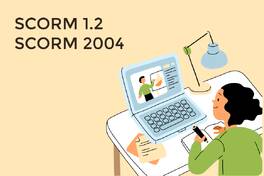
Approximate reading time: 4m 25s
Profession Without Borders: How Online Work and Digitalization Are Transforming Career Development
With the advent of new technologies and changes in the business environment, traditional professions and career paths are beginning to lose their significance. In the book "Work Without Jobs: How to Reboot Your Organization's Work Operating System," authors Ravin Jesuthasan and John Boudreau offer a radically new perspective on the concept of work and profession. They present how organizations can adapt to changes and create new opportunities for career development based on flexibility and adaptability.
![]() Do you need an easy-to-use LMS with excellent support and fast hosting in your native language? If you would like a demonstration or more information, call +359 878 685 304.
Do you need an easy-to-use LMS with excellent support and fast hosting in your native language? If you would like a demonstration or more information, call +359 878 685 304.
From Traditional Professions to Flexible Work Tasks
One of the main ideas in the book is that the traditional understanding of a profession as a fixed role with specific duties and responsibilities no longer reflects the reality of the modern labor market. Instead, Jesuthasan and Boudreau propose a new paradigm—viewing work as a collection of tasks that can be performed by different sources, including employees, freelancers, and even automated systems.
For example, in the traditional profession of an accountant, tasks like report preparation, financial data analysis, and tax planning could be distributed among several different specialists and technologies. By breaking these tasks down into smaller, more manageable parts, organizations can optimize work and reduce dependency on specific employees, a key advantage in a rapidly changing business environment.
A New Approach to Labor Management
Another key concept presented in the book is the "work operating system" (WOS). This is a new framework that allows organizations to be more flexible and adaptive in managing work and resource allocation. Instead of focusing on traditional hierarchies and fixed positions, companies can build a dynamic system that enables rapid task reallocation based on business needs.
One practical example is how a large tech company uses this approach to adapt to market changes. The company has restructured by creating "talent pools," where specialists with various skills can be quickly mobilized for different projects. This not only speeds up the adaptation process but also allows employees to develop their skills in different areas, significantly enriching their career development.
Technology as a Catalyst for Change in Professions
One of the most important aspects of the new work operating system is the role of technology. Jesuthasan and Boudreau emphasize that automation and artificial intelligence should not be seen as a threat to jobs, but as a tool that can complement human capabilities and create new opportunities for professional development.
For example, in the field of medicine, rather than fearing that robots will replace doctors, we can think about how automation can ease routine tasks, leaving more time for complex clinical decisions and patient interactions. In this context, the profession of a doctor does not disappear but transforms, becoming more focused on the human aspects of healthcare, which in turn offers new opportunities for career development.
Personalized and Flexible Career Paths
A key idea in the book is that the traditional linear career path no longer meets the needs of modern professionals. Instead, the future of career development will be much more personalized and dynamic. Jesuthasan and Boudreau argue that companies should create conditions where employees can move between different roles and tasks based on their skills, interests, and business needs.
For example, in the field of marketing, a specialist may start their career as a data analyst, then move to campaign management, and finally focus on strategic planning. This flexibility not only allows the individual to develop a broad range of skills but also gives them the ability to adapt their career to market changes and personal preferences.
New Strategies for Talent Management
With the transformation of work and professions, talent management must also change. The book explores how companies can create new strategies for hiring, training, and motivating their employees that reflect the new reality of work.
For example, instead of focusing on hiring employees for specific positions, companies can start looking for people with certain skills and growth potential who can be deployed in various roles depending on business needs. This may also include the use of freelancers and external consultants to complement internal teams and provide the necessary flexibility.
The Profession in the Era of Change
The book "Work Without Jobs: How to Reboot Your Organization's Work Operating System" offers a new perspective on how we should think about professions and career development in the modern world. In the context of rapid technological changes and globalization, traditional models of work and career development are no longer effective. Jesuthasan and Boudreau present a new work operating system that is more flexible, adaptive, and personalized, which can help organizations and their employees succeed in the new reality.
Career Development and Online Learning Through LMS
As professions and career paths change rapidly, online learning plays a crucial role in developing the skills and knowledge necessary for adapting to the new realities of work. Learning Management Systems (LMS) offer a flexible and accessible platform that allows professionals to develop themselves regardless of location or schedule.
Online learning through LMS enables employees to acquire new skills at a time that suits them, while also allowing them to balance work, education, and personal life. This is especially important in dynamic professions where skill requirements change rapidly and require continuous improvement.
One example discussed in the book is how a global financial services company uses an LMS platform to provide its employees with access to courses in data and analytics—skills critical to the organization's future. As a result, employees not only enhance their abilities but also become more competitive in the labor market, positioning themselves for better career opportunities.
LMS platforms also facilitate personalized learning by providing content tailored to the individual needs and goals of each employee. This creates conditions for more effective career development, allowing everyone to progress at their own pace and choose the courses that are most important to their professional path.
In the context of the new work operating system presented in the book, online learning emerges as a strategic tool that helps organizations prepare their employees for future challenges while supporting their career development and satisfaction. With the continuous development of technology, LMS platforms will become increasingly important for the successful adaptation of employees to new professional realities.
![]() Do you need an easy-to-use LMS with excellent support and fast hosting in your native language? Our distance learning software (LMS) is fully available in Bulgarian (translated into 28 languages), with built-in features for automatic management of learners and courses within the platform. It complies with the strict requirements of the Data Protection Act and the European Data Protection Regulation. It supports various formats and other great features. If you would like a demonstration or more information, call +359 878 685 304.
Do you need an easy-to-use LMS with excellent support and fast hosting in your native language? Our distance learning software (LMS) is fully available in Bulgarian (translated into 28 languages), with built-in features for automatic management of learners and courses within the platform. It complies with the strict requirements of the Data Protection Act and the European Data Protection Regulation. It supports various formats and other great features. If you would like a demonstration or more information, call +359 878 685 304.
This book is especially useful for HR professionals who want to understand how to manage and develop talent in their organizations in line with changes in professions and career development. By adapting the new principles presented in the book, companies can not only remain competitive but also create a more fulfilling and successful work environment for their employees.



